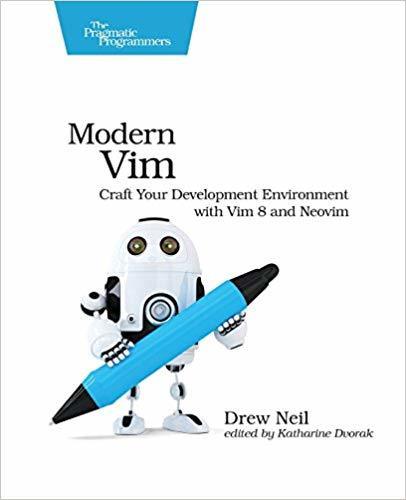Daniel Miessler's Blog, page 80
August 25, 2019
Vim Config Update: 2019 Edition

I like to update my Vim configuration every 2-5 years just to make sure I am as ninja and efficient as possible.
My full Vim Tutorial
But the last few times I’ve been focused on one main thing: simplicity. In my previous cycle that meant moving from Vim 7.x to Vim 8, which included a completely different way to manage plugins.
This time the impetus is a book—specifically Modern Vim, by Drew Neil—and I’m using it to not just update with some new tricks, but also to simplify my Plugin management.
So what you’ll find below are all the changes I’m making to my config for 2019, with many of them coming directly from Modern Vim.
1. I moved to Neovim

The Modern Vim book—so basically Drew Neil—was heavily pushing Neovim so I decided to take a couple hours to explore it. Short version is that it’s a cleaner, trimmed-down, more performant version of Vim with a better development community. Check, check, and check.
It feels so great to just start over.
So I migrated. But I didn’t use the training wheels (importing your previous .vimrc)—no, I started from scratch. It felt so good.
2. .vimrc pruning

The first thing I do when I start an update/cleaning session is go into my .vimrc file and pull out stuff I don’t understand or remember. Usually this is from some random thing I heard of somewhere and wanted to try, or from some previous hack regarding plugins. Ideally I’d like to not have a single setting in there that I don’t understand, but over time these grow so as to make that a high standard.
This year, though, I really did it. Because I moved to Neovim I just completely started over (see above).
3. Updated Plugin management with vimpack
Ok, so this is the craziest thing. This is perfection. Valhalla.
In previous versions of Vim you had to sacrifice all sorts of animals to be able to manage plugins. You could do things manually, you could use Pathogen, you could do custom stuff—etc. But it was all kind of gross.
Even with the latest upgrades in Version 8, you still had management problems with plugins that you had in plugins/bundle/something/something/ because if they were git repositories (why wouldn’t they be) then they threw errors when you tried to update them.
Well, now there’s a new system altogether, called Minpac. It’s so sweet. Check this.

Vim plugin management using Neovim/Minpac
So, all you do is add those lines of code to your Neovim install, and it will—get this—automatically install them and keep them updated!
In fact, you don’t even have to start with plugins installed (other than maybe Minpac itself) since Minpac installs them all into its own folder structure and handles everything.
I’m very happy right now.
4. A few new tricks
And here are a few changes/efficiencies I’ve picked up in the last few days of studying.
# Copying and pasting from the system clipboard
It’s always been annoying to have two separate clipboards—one in Vim and one in macOS (or whatever OS you’re on). Well now you can deal with them both independently or copy and paste between them.
vnoremap y "+y
# Changed my leader key to "'>" (single quote)
I’m a huge fan of using leader shortcuts, but for some reason the SPACEBAR wasn’t working for me. So I changed it to “‘” a single quote, which is one key to the right of my right hand’s pinky finger. Super efficient.
# I remapped the ":" shortcut (which normally requires Shift-;), to ";"
This just makes it easier to enter commands from within Vim; my right pinky is already sitting on the “;”, and now it’s just one stroke instead of a SHIFT chord.
# Added a few key leader shortcuts
Save file (leader-w)
Save and exit (leader-e)
Exit without saving (leader-q)
Summary
So here’s what I now have:
Neovim instead of Legacy Vim.
A completely new vimrc.
A completely new way of managing plugins that is completely built-in and automatic.
A few new tricks.
Here’s my $vimrc for anyone interested.
Solid upgrade.
Notes
There is some wrangling that needs to be done to get Neovim installed and configured, but it’s outside the scope of this article. It’s not too terribly difficult really; it’s mostly just realizing that Neovim works off of a init.vim file instead of .vimrc, and that it uses a different directory structure. Other than that most stuff is pretty close to identical.
My $VIMRC.
—
Become a direct supporter of my content for less than a latte a month ($50/year) and get the Unsupervised Learning podcast and newsletter every week instead of just twice a month, plus access to the member portal that includes all member content.
August 23, 2019
The ŌURA Sleep Tracker Ring

I’ve been looking for a sleep-tracking solution for several years, but hadn’t been able to find anything.
I was thinking about getting a sensor that goes under the sheet on the bed, but those seemed kludgy. And the wearables I’d seen thus far didn’t feel ready. But after hanging out with my buddy Mike Dahn recently I saw he was wearing a ring that looked pretty nice, and I asked him about it.
It turned out to be an ŌURA Ring, which is a full-featured activity tracker focused mostly on sleep. Perfect.

I’ve only had it for a couple of days, but it’s gone well so far. It charges quickly and the battery is supposed to last for several days, and the sleep data is available in both the standalone app (which is quite nice) and the iOS Health app as well.
To me this closes the loop on activity monitoring for the near future (assuming I stick with this device). I feel like sleep tracking was the one piece that wasn’t present in my current life measurement stack.
The battery is supposedly decent
I have the matte Titanium one, and it looks decent
You can wash your hands with no issues
It doesn’t seem overly prone to scratches
The integration with iOS appears to be seamless
Those are pretty much all my checkboxes, and despite never having worn a ring in my life—here I am.

If you’ve been looking for a sleep tracker that doesn’t involve putting something on the bed, this might be your move.
—
Become a direct supporter of my content for less than a latte a month ($50/year) and get the Unsupervised Learning podcast and newsletter every week instead of just twice a month, plus access to the member portal that includes all member content.
August 20, 2019
Summary: Never Split the Difference
10/10
My One-Sentence Summary
Content Extraction
Takeaways
My book summaries are designed as captures for what I’ve read, and aren’t necessarily great standalone resources for those who have not read the book.
Their purpose is to ensure that I capture what I learn from any given text, so as to avoid realizing years later that I have no idea what it was about or how I benefited from it.
My One-Sentence Summary
This book gives you negotiating skills so good that I feel guilty telling you about them—because they can be used to seriously manipulate people.
Content Extraction
The key to negotiation is deep listening
Tactical empathy is listening specifically for the real obstacles that are stopping progress
Mirrors are used to let people know you’re empathizing with them, and to keep talking so you learn more about the situation
Labeling is when you call out the obstacles you’ve heard while listening, like saying, “It sounds like you think I’m here just for myself.”, or “What I’m hearing is that you care more about the quality then making a dollar.”
Hearing “no” is often far better than yes because it gives you information about boundaries and sensitivities
There are three kinds of yes: counterfeit, confirmation, and commitment
What you really want to hear is, “that’s right”, and you can get there partially by labeling their emotions
Pivot to non-monetary terms
Ask calibrated questions like, “How am I supposed to do that?” to get them to talk more and to learn more about the situation
Only 7 percent of a message is based on the words while 38 percent comes from the tone of voice and 55 percent from the speaker’s body language and face
When calculating final amounts, use precise non-round numbers
At the end also add in a non-financial request to show you’re finished
Find the black swan information that can help you avoid disaster and get what you’re after
You don’t rise to the occasion in negotiations; you fall to the least level of preparation.
Takeaways
Read this book once every two years
Don’t share this book with evil people; it’ll introduce harm into the world
Use these techniques for mutual benefit, not to screw people over
You can find my other book summaries here.
Notes
Seriously, this is the closest thing to magic spells I’ve ever seen in a book.
One of my only 10/10 reviews.
—
Become a direct supporter of my content for less than a latte a month ($50/year) and get the Unsupervised Learning podcast and newsletter every week instead of just twice a month, plus access to the member portal that includes all member content.
Unsupervised Learning: No. 190 (Member Edition)

This is a Member-only episode. Members get the newsletter every week, and have access to the Member Portal with all existing Member content.
Non-members get every other episode.
or…
—
Become a direct supporter of my content for less than a latte a month ($50/year) and get the Unsupervised Learning podcast and newsletter every week instead of just twice a month, plus access to the member portal that includes all member content.
How Weaponized Grit Can Lead to Unhappiness
I’m reading an extraordinary book right now, called Range: Why Generalists Triumph in a Specialized World. As you may infer, it’s about the advantages that generalists have over specialists, and how those advantages are increasing.
I think one of the most interesting things the book has done for me is show me how grit can have a downside.
Since learning about it several years ago, I’ve always seen grit as the ultimate superpower—the one attribute (along with creativity) that enables someone to win.
But the book does a great job of showing how it can actually be twisted into a negative. The mechanism for that is fairly straightforward: you have an overly goal-driven family (often immigrants to the West) who imbues their kids with massive amounts of grit and self-discipline, which in turn forces them to choose their forever life when they’re very young.
The book argues a few really interesting things about this. First, it argues that people who pick early and specialize are often not the best in that thing, especially if it benefits from a breadth of knowledge. Second, it argues that people in that situation are not likely to be happy, since it’s often nearly impossible to know what you really want until later in life. Perhaps late 20’s or even into your thirties or 40’s.
The book gives multiple examples of great people who butterflied around multiple things, and failed at most of them, before finally falling (often by luck) into the thing that they were great at and that made them famous. One should be cautious of such examples, since you don’t know the percentage of the dataset they represent, but the examples of Van Gogh and Darwin were quite compelling regardless.
I also loved how they mentioned numerous examples of where cross-domain knowledge, and integrators, win the day. The author also talked about Superforecasting, which is one of my favorite books ever about thinking.
Specifically, it talked about how cross-domain thinkers were far better at predictions than people who were deep—and especially famous—experts in their fields. A big lesson there for me was to always watch for blindness caused by ego, i.e., the more you think you’re an expert in prediction in a complex field that you’re known in, the less likely you’re good at it. That’s a mistake I hope to always remain aware of.
Anyway, I highly recommend this book.
It provided ideas for what an ultimate curriculum should look like, which is one of my long-term life projects. In short, that a perfect education should involve lots of dabbling and exploration, and a final path should be eased into rather than forcefully selected. This is for a better type of society, by the way, not necessarily your current 17-year-old.
Most importantly, it taught me that grit should be applied in a more broad sense, to overall goals, and not to artificially acquired targets given by others.
It’s not heroic to sit and grind for hours or years on an instrument or a career that you don’t care about, when you could be much better at—and successful in—something else entirely.
It seems that grit, like emotion or technology, is a tool that you must use carefully.
—
Become a direct supporter of my content for less than a latte a month ($50/year) and get the Unsupervised Learning podcast and newsletter every week instead of just twice a month, plus access to the member portal that includes all member content.
August 16, 2019
The Difference Between Data, Information, and Intelligence

The terms intelligence, information, and data are thrown around pretty loosely in most tech circles, and this inevitably leads to people confusing and/or conflating them. What follows is a simple explanation of how the related terms are different from each other, and how they work together.
Let’s get into it.
Sand, pebble, boulder.
Data are raw, individual, and unarguable facts. Examples might include the temperature at 13:37PM on the roof of San Francisco City Hall, or the amount of light coming off the Sun according to a particular solar telescope.
Information is the combination of data into a form that can answer an everyday question. Examples might include whether a country has a higher than average GDP, or whether a particular plant is native to California.
Intelligence is the combination of information into a form that tells a story and inform decisions. Examples might include a narrative stating that Iran seems poised to invade Iraq, and that now is the time to move key resources. Or one that says a politician in Northern California seems ready to vote against Cannabis legislation, so it might not be a good time to enter that business.
Intelligence is clutch when decision-makers are facing uncertainty, which is usually always.
If you’re wrong about either current state or the rules of the game, predictions become precarious.
Intelligence is decision-support. It’s a tool for making intelligent predictions about the future—based on solid understanding of the present—in order to take a course of action that improves outcomes.
Information is used to piece together the necessary understanding of the world to create that narrative, and data is what provided the inputs for the information.
A real-world example of all three

Let us say that there is a war zone in Canada (I know, far-fetched already), and some troops are on patrol in a city center looking for the resistance’s most notorious warlord. Canadian military leaders are eager for intelligence that can help find him.
Imagine many more examples of the same kind of data.
Data: A man crossed the street at Montegue and DeGaul at 19:07PM looking suspicious.
Data: That same man left a nearby building carrying a briefcase chained to his hand.
Data: An anonymous caller called in and said the warlord is staying within 3 blocks.
Information: Encrypted radio traffic has increased by 37% compared to 2 hours ago.
Information: A number of locals sympathetic to the rebels have started leaving the area.
Intelligence: Since this warlord likes to use suitcase bombs, and this type of pattern has been seen before in previous attacks, another attack is likely to occur in the next few hours.
Intelligence: Therefore, police should be notified and we should get all of our VIPs out of the area immediately.
The data need to be harvested and assembled into information, but even then you still (generally) need a human analyst to go from information to intelligence.
It’s also important to note that intelligence can be wrong. Just because the pattern happened before doesn’t mean it’ll repeat. And vice versa.
In this case we have a simple terrorist attack that follows a pattern, but the problem gets a lot harder with events that have less of a pattern and that happen less frequently.
Summary
Data are individual observations.
Information is a useful collection of data.
Intelligence combines information to form a predictive narrative that enables better decision-making.
All three levels can have errors, and problems compound as they move up the stack.
Notes
Image from Recorded Future, which is a really cool (but expensive) product by the way.
—
Become a direct supporter of my content for less than a latte a month ($50/year) and get the Unsupervised Learning podcast and newsletter every week instead of just twice a month, plus access to the member portal that includes all member content.
July 28, 2019
Unsupervised Learning: No. 188 (Member Edition)

This is a Member-only episode. Members get the newsletter every week, and have access to the Member Portal with all existing Member content.
Non-members get every other episode.
or…
—
Become a direct supporter of my content for less than a latte a month ($50/year) and get the Unsupervised Learning podcast and newsletter every week instead of just twice a month, plus access to the member portal that includes all member content.
July 24, 2019
Humans Are Genebots

Somewhere in my 20’s or 30’s I became enamored with the idea of prep schools and elite colleges. I’d never gone to either of those, so it wasn’t nostalgia. And I didn’t really know about them growing up, so it’s not as if I was bitter about missing a tangible opportunity.
I didn’t even know I was supposed to go to college, let alone a prestigious one.
The feeling was more of a slow-building envy for something that I imagined to be extremely pleasurable.
I think the catalyst may have actually been Harry Potter. I loved everything about the process he went through. He gets selected into an elite school that only certain people can go to. He shows up and there are uniforms, there are special magic classes, and the dorms are split up by age. Then there’s the sorting hat, and the Quidditch team, and the special courses like Defense Against the Dark Arts.
It hit all the right “arrival” notes on an instrument within me that I didn’t know existed.
The military is full of nested tiers of eliteness in various areas.
Now that I think about it, I didn’t have the prep school experience, but I had something similar through the military. In the Army I was in the 101st Airborne, and I was lucky enough to get Airborne and Air Assault qualified right out of basic training, and most newish people thought I was something special because of the two winged badges on my uniform.
But there are many levels above just the 101st. There are Rangers (which I passed all the excruciating mental and physical tests for but couldn’t proceed in due to an earlier injury), then there’s Special Forces, then there’s Delta. And it’s the same in the Navy and Marines and Air Force—they each have their elite, elite of the elite, and then elite within that.

Evolution gives you little rest before prodding once again
Something about that has always appealed to me. As I think about it, it reminds me of Abercrombie and Fitch marketing, when I used to walk through the mall when I was in the military. The models there often had the prep school look. The northeastern, yachting, rowing, “I got into that elite school” look about them, which is why they call them models, and why they call it marketing.
They’re selling a better version of yourself, a version that you wish you were.
It reminds me of how they told me in elementary to fear junior high, and junior high told me the same about high school, and so on through college and the real world.
And this doesn’t stop with prep schools or the military. Oh no. It just keeps going. As soon as you think you’ve hit some sort of plateau, where you can be happy with your accomplishments, that’s when you learn about the tier above that you’re not yet a part of.
This is quite strong in the tech industry. Oh, you’re in tech? Cool, are you a developer? What language do you use? Do you work at one of the top 5 tech companies? Do you have stock? Did you start a company? How much money did you raise? Do you have an exit yet?
It’s endless.
If you look at any industry, or any social structure, you can see instantiations of this. Hollywood has the awards, and the ratings, and the dinners, and short lists of top directors and actors.
I have a new goal of getting something published in the New York Times. Anything really.
Writers can be respected for getting published, but where did you get published? Salon? Oh, that’s nice. I was in WSJ. WSJ? That’s nice. I was in the Economist. It’s very exclusive. That’s cute: I have a column with the NYT. And on and on it goes.

The Pyramid of Capitalism
Of course there are multiple tiers of authors as well. It’s one thing to have a book on Amazon, and it’s another to be top in category. But the real question is whether you’ve been on the New York Times’ best sellers list. Oh, you were there? For how long? How many times? For how many books?
Oh, you have a podcast? Where are you on the charts? How many subscribers? How much do you make from sponsors? Oh, you’re a painter? How many showings have you done, at what locations? Who showed up at the afterparty?
These are all instances of evolution playing its only hand, which is prodding you towards higher and higher tiers of greatness, only to remind you immediately—if you do in fact make it—that there’s another level just beyond. Our genes can only high-five us for a brief moment, after which point your current level of success becomes the new baseline, and it’s time to start hustling once again.
Social media so addicting because it’s emulating this loop.
This is why prep schools, and uniforms, and special badges and challenge coins are so coveted: they’re the visible accouterments of a status plateau that others can look up to, even if you are already searching for the next ladder.
I know it sounds like I’m assigning agency to evolution, but I’m not.
We are exoskeletons for genes fighting to propagate. All those little squirts of happiness are part of the gamification system that genes—using evolution—created to inspire us to be their unknowing champions.
Some see this as reductionist—and perhaps it is—but I don’t see it as a cause for nihilism.

I know that beauty and friendship and love are—in some sense—illusory constructs designed to inspire our ambition, which in turn helps our genes to win.
But I don’t care.
I’d characterize this as Absurdist because it’s simultaneously accepting bleak truth and embracing the enjoyment of life.
These exoskeletons are all we have for now. They’re our whole universe. You could tell me that love is a chemical, or that a flower is a configuration of atoms. Or that these things only exist at a very specific size scale. Go down to the atomic level, or up to the planet level, and flowers have little meaning.
But so what? That happens to be the exact level of the genebot. And it’s pretty glorious.
The genebot level is where love and flowers and poetry are the most spectacular things in the universe.
Yes, it’s an illusion created to serve another life form, but it’s still pretty remarkable. And compared to being nothing, I’ll happily take it.
At least until I find something better.
—
Become a direct supporter of my content for less than a latte a month ($50/year) and get the Unsupervised Learning podcast and newsletter every week instead of just twice a month, plus access to the member portal that includes all member content.
Unpacking the Evolution-Granted Bliss of Prep Schools and Elite Institutions

Somewhere in my 20’s or 30’s I became enamored with the idea of prep schools and elite colleges. I’d never gone to either of those, so it wasn’t nostalgia. And I didn’t really know about them growing up, so it’s not as if I was bitter about missing a tangible opportunity.
I didn’t even know I was supposed to go to college, let alone a prestigious one.
The feeling was more of a slow-building envy for something that I imagined to be extremely pleasurable.
I think the catalyst may have actually been Harry Potter. I loved everything about the process. He gets selected into an elite school, that only certain people can go to. He shows up and there are uniforms, and there are classes, with older kids and younger kids.
Then there’s the sorting hat, and the Quidditch team, and the special classes, and the interesting professors, and the various cliques within the students.
The military is full of nested tiers of eliteness in various areas.
Now that I think about it, I didn’t have the prep school experience, but I had something similar through the military. In the Army I was in the 101st Airborne, and I was lucky enough to get Airborne and Air Assault qualified right out of basic training, and most newish people thought I was something special because of the two winged badges on my uniform.
But there are many levels above just the 101st. There are Rangers (which I passed all the excruciating mental and physical tests for but couldn’t proceed in due to an earlier injury), then there’s Special Forces, then there’s Delta. And it’s the same in the Navy and Marines and Air Force—they each have their elite, elite of the elite, and then elite within that.

Evolution gives you little rest before prodding once again
Something about that has always appealed to me. As I think about it, it reminds me of Abercrombie and Fitch marketing, when I used to walk through the mall when I was in the military. The models there often had the prep school look. The northeastern, yachting, rowing, “I got into that elite school” look about them, which is why they call them models, and why they call it marketing.
They’re selling a better version of yourself, a version that you wish you were.
It reminds me of how they told me in elementary to fear junior high, and junior high told me the same about high school, and so on through college and the real world.
And this doesn’t stop with prep schools or the military. Oh no. It just keeps going. As soon as you think you’ve hit some sort of plateau, where you can be happy with your accomplishments, that’s when you learn about the tier that you’re not yet a part of.
This is quite strong in the tech industry. Oh, you’re in tech? Cool, are you a developer? What language do you use? Do you work at one of the top 5 tech companies? Do you have stock? Did you start a company? How much money did you raise? Do you have an exit yet? It’s endless.
If you look at any industry, or any social structure, you can see signs of this. Hollywood has the awards, and the ratings, and the dinners, and the social groups of top directors and actors.
I have a new goal of getting something published in the New York Times. Anything really.
Writers can be respected for getting published, but where did you get published? Salon? Oh, that’s nice. I was in WSJ. WSJ? That’s nice. I was in the Economist. It’s very exclusive. That’s cute: I have a column with the NYT. And on and on it goes.

The Pyramid of Capitalism
And there are infinite tiers of authors as well. It’s one thing to have a book on Amazon, and it’s another to be top in category. But the real question is whether you’ve been on the New York Times’ best sellers list. Oh, you were there? For how long? How many times? For how many books?
You see the same patterns everywhere. You have a podcast? How are you on the charts? How many subscribers? How much do you make from sponsors? You’re a painter? How many showings have you done, at what locations? What parties do you get invited to?
These are all instances of evolution playing its only hand, which is prodding you towards eliteness, only to remind you immediately—if you do in fact make it—that there’s another level just beyond.
It seems evolution can only high-five us for a brief moment, after which point your current level of success becomes the new baseline, and it’s time to start hustling.
This is why prep schools, and uniforms, and special badges are so coveted. They’re the visible accouterments of a status plateau that others can look up to, even if you are already searching for the next ladder.
—
Become a direct supporter of my content for less than a latte a month ($50/year) and get the Unsupervised Learning podcast and newsletter every week instead of just twice a month, plus access to the member portal that includes all member content.
July 21, 2019
Unsupervised Learning: No. 187
Get the podcast for this episode.
.errordiv { padding:10px; margin:10px; border: 1px solid #555555;color: #000000;background-color: #f8f8f8; width:500px; }#advanced_iframe {visibility:visible;opacity:1;}#ai-layer-div-advanced_iframe p {height:100%;margin:0;padding:0}
—
Become a direct supporter of my content for less than a latte a month ($50/year) and get the Unsupervised Learning podcast and newsletter every week instead of just twice a month, plus access to the member portal that includes all member content.
Daniel Miessler's Blog
- Daniel Miessler's profile
- 18 followers



